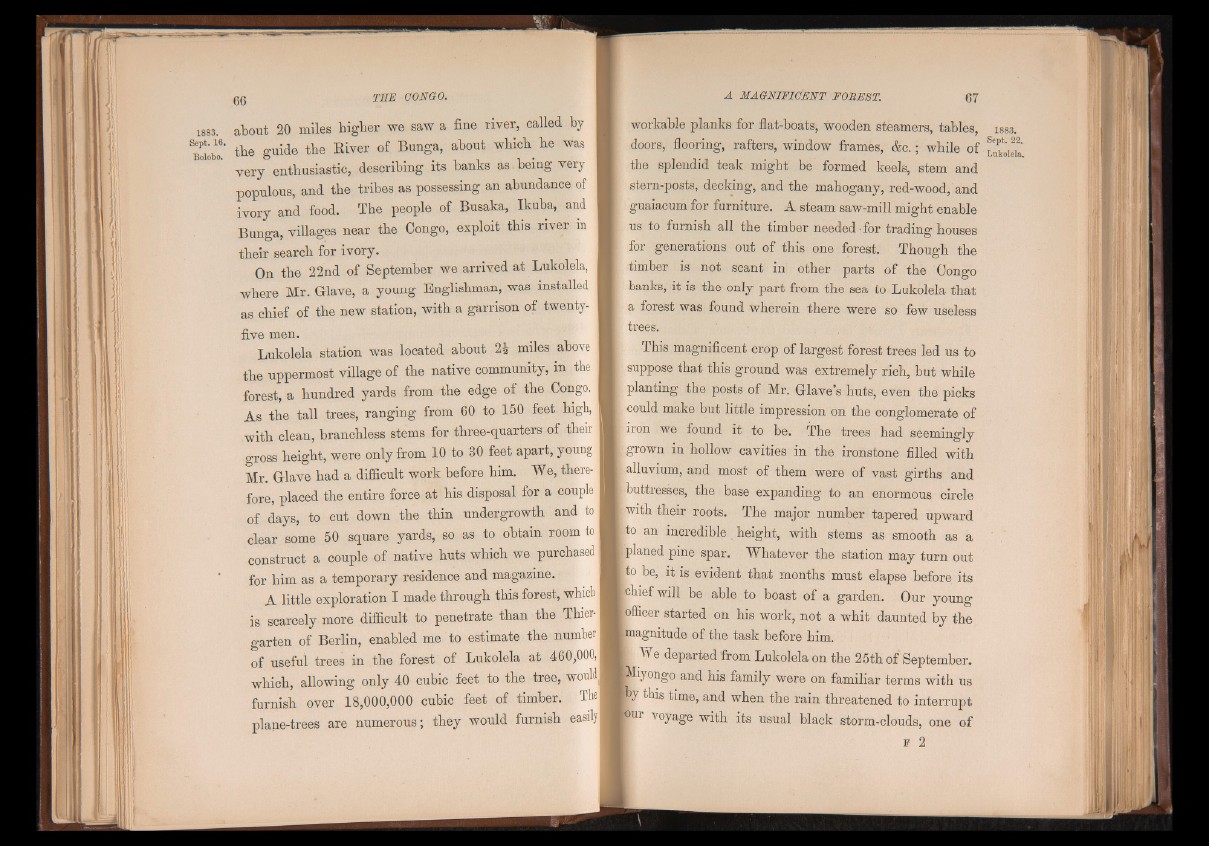
Boleto.
about 20 miles higher we saw a fine river, called by
the guide the Eiver of Bunga, about which he was
very enthusiastic, describing its banks as being very
populous, and the tribes as possessing an abundance of
ivory and food. The people of Busaka, Ikuba, and
Bunga, villages near the Congo, exploit this river in
their search for ivory.
On the 22nd of September we arrived at Lukolela,
where Mr. Glave, a young Englishman, was installed
as chief of the new station, with a garrison of twenty-
five men.
Lukolela station was located about 2£ miles above
the uppermost village of the native community, in the
forest, a hundred yards from the edge of the Congo.
As the tall trees, ranging from 60 to 150 feet high,
with clean, branchless stems for three-quarters of their
gross height, were only from 10 to 30 feet apart, young
Mr. Gflave had a difficult work before him. We, therefore,
placed the entire force at his disposal for a couple
of days, to cut down the thin undergrowth and to
clear some 50 square yards, so as to obtain room to
construct a couple of native huts which we purchased j
for him as a temporary residence and magazine.
A little exploration I made through this forest, which j
is scarcely more difficult to penetrate than the Thier
garten of Berlin, enabled me to estimate the number
of useful trees in the forest of Lukolela at 4 60,000,!
which, allowing only 40 cubic feet to the tree, would.
furnish over 18,000,000 cubic feet of timber. T l
plane-trees are numerous; they would furnish easily
workable planks for flat-boats, wooden steamers, tables,
doors, flooring, rafters, window frames, &c. ; while of
the splendid teak might be formed keels, stem and
; stern-posts, decking, and the mahogany, red-wood, and
; guaiacum for furniture. A steam saw-mill might enable
j us to furnish all the timber needed ■ for trading houses
for generations out of this one forest. Though the
i timber is not scant in other parts of the Congo
banks, it is the only part from the sea to Lukolela that
I a forest was found wherein there were so few useless
| trees.
This magnificent crop of largest forest trees led us to
| suppose that this ground was extremely rich, but while
I planting the posts of Mr. Glave’s huts, even the picks
I could make but little impression on the conglomerate of
I iron we found it to be. The trees had seemingly
I grown in hollow cavities in the ironstone filled with
I alluvium, and most of them were of vast girths and
I buttresses, the base expanding to an enormous circle
I with their roots. The major number tapered upward
11° an incredible height, with stems as smooth as a
I planed pine spar. Whatever the station may turn out
■to be, it is evident that months must elapse before its
■chief will be able to boast of a garden. Our young
■officer started on his work, not a whit daunted by the
■magnitude of the task before him.
I We departed from Lukolela on the 25th of September.
I ptiyongo and his family were on familiar terms with us
1 t i m e , and when the rain threatened to interrupt
Bur voyage with its usual black storm-clouds, one of
F 2
1883.
Sept. 22.
Lukolela.